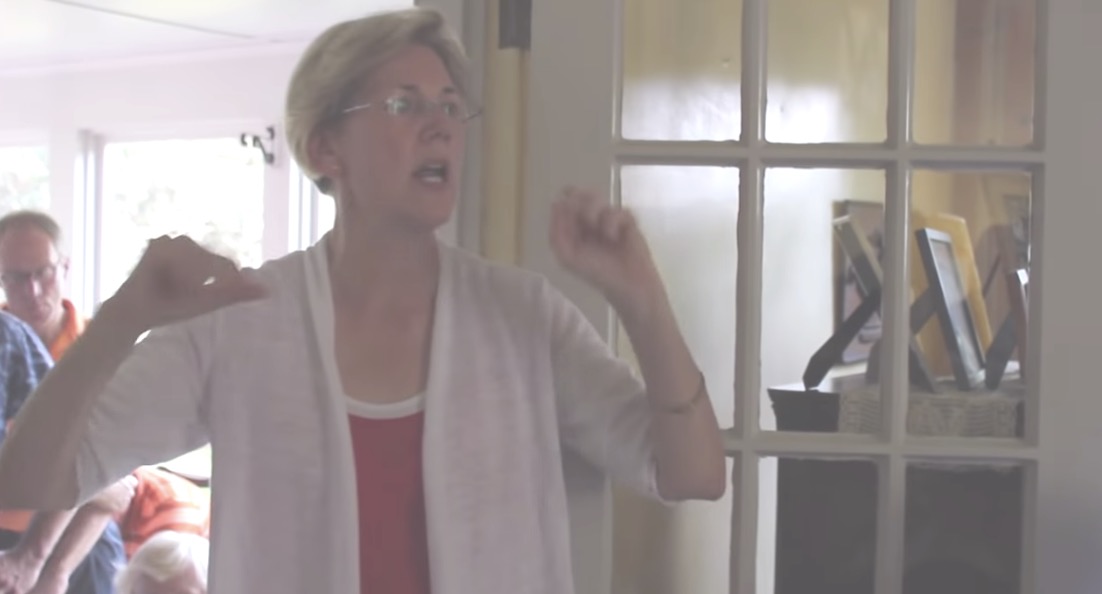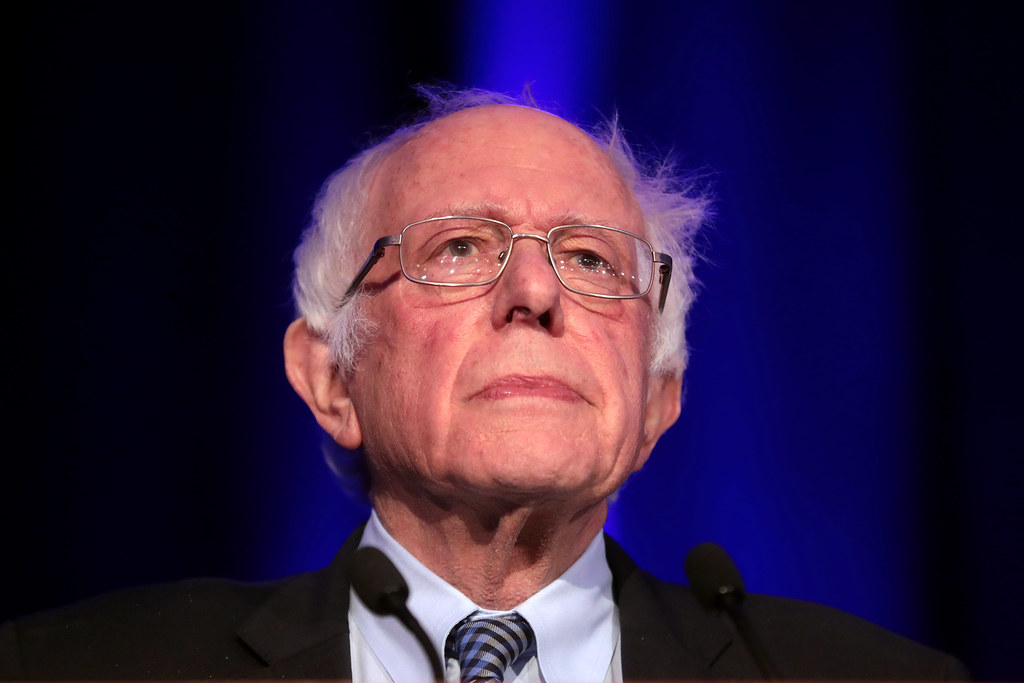Report examines the National Rental Housing Council (NHRC) and the corporate landlords that lead it.
Over half of dollar store items are poisonous
Over half of dollar store items test positive for poisons including food and children's toys
Did you know there’s an Elizabeth Warren wiki?
The Elizabeth Warren wiki includes information on my favorite @SenWarren speech: 'You Didn't Build That On Your Own'
How by abandoning their vows to serve the public, American politicians precipitated the pandemic meltdown
In a brilliant New Yorker article, Keeanga-Yamahtta Taylor lays out the steps by which the abandonment of middle and poor Americans by both US political parties led to society’s present collapse. Although the coronavirus was the immediate trigger, the erosion of society’s wellbeing began way back in 1969. Collapse was an occurrence primed to happen at some point, and now just happened to be the time.
For 50 years, since 1979, national leaders increasingly backed away from their obligation to care for vulnerable and working class Americans. As they did, financial instability increased and the chance to acquire wealth became much more limited. Those were the perfect conditions for the meltdown known as American life in the days of the COVID-19 pandemic.
Millions were driven into a state of deprivation that made happy lives impossible. And over time, the country destabilized economically. Students were still paying back college loans into their golden years. Aspiring homeowners could not afford mortgages. Urban residents live with air quality so poor that one in four has asthma and health concerns affect all areas of family’s lives. Poor health affects the’ ability to earn adequate incomes and keep up with the demands of digital life.
For years, the United States has gotten away with persistently chipping away at its weak welfare state by hiding or demonizing the populations most dependent on it. The poor are relegated as socially dysfunctional and inept, unable to cash in on the riches of American society ... The debate over the role of government in addressing income inequality, housing insecurity, debt accumulation, and health care continues, now against the grim backdrop of the raging coronavirus. It is difficult to articulate the speed with which the U.S. and, indeed, the world, has descended into an existential crisis.
Resources for ALICE home buyers and renters
Resources for ALICE home buyers and renters #p2
On May 28 students will rally for a millionaires tax to provide more school aid
On May 28 students will rally for a millionaires tax to provide more school aid #p2
Newark Mayor Baraka on the deaths of three preemie infants in University Hospital

Speaking about the three preemie infants who recently passed away at University Hospital in Newark, Mayor Ras J. Baraka shared these comments:
“The deaths of three premature infants with an Acinetobacter bacteria and the infection of a fourth, all cared for at University Hospital, are stark reminders that an overhaul of the quality of care and the leadership of the hospital is urgently needed. The infants had a variety of other medical conditions, but the fact remains that they contracted the bacteria in the hospital’s neonatal ICU. The Newark Department of Health and Community Wellness will work collaboratively with the New Jersey State Department of Health to continue careful monitoring of the situation in that unit.
“In July, Governor Murphy acted swiftly and decisively in appointing a monitor for University Hospital. Today, more action is needed. The hospital is central to providing health care to Newark residents, and I have been very concerned about its quality of care, its leadership’s failure to live up to the Newark Agreement negotiated when the hospital was created, their insensitivity to the opinions of residents, their attempt to reduce the number of pediatric beds without consulting myself or the Governor, and the failing grade they received on their level of care from the Leapfrog Group.
“The time has come for the State of New Jersey and the Newark community to collaborate in setting a new direction for University Hospital:
The hospital needs to become more responsive to the people it serves and sensitive to their needs. This requires more community input with new leadership, including a new board with adequate representation of Newark residents and a new President/CEO with a history of sensitivity to community.
State and federal investment is needed to enable University Hospital to become the first-class teaching hospital that it was intended to be, including an overhauled emergency room, a world-class trauma center, and more outpatient clinics to meet the underserved medical needs of the people of Newark.
“In 1968, the state and federal governments negotiated a detailed pact with the people of Newark to create a top-notch medical facility with community involvement and oversight in perpetuity. On the 50th anniversary of the Newark Agreement, it’s time to keep the promise.”
Bernie Sanders will hold Town Hall on inequality with Elizabeth Warren & Michael Moore
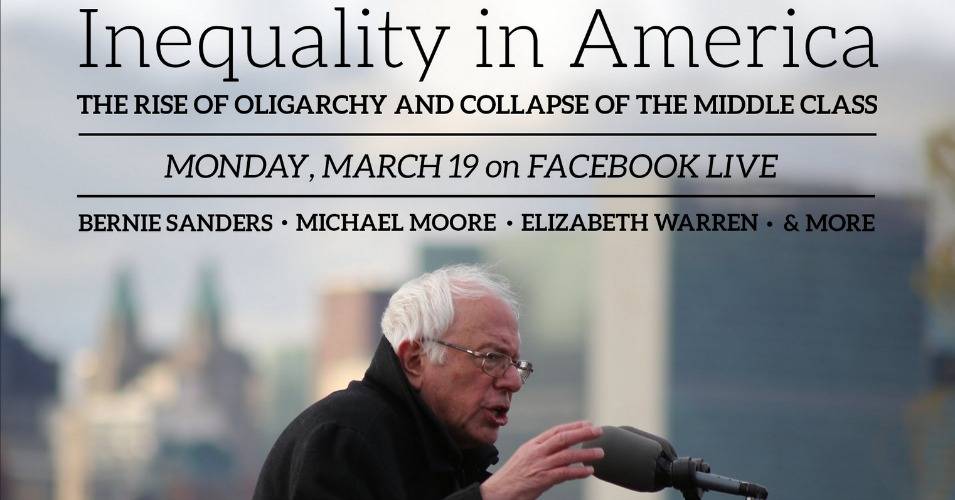
Sen. Bernie Sanders (I-Vt.) announced Thursday that on March 19 he will host Inequality in America: A National Town Hall on Facebook Live focused on inequality in the United States in partnership with The Guardian, NowThis, The Young Turks and Act.tv.
Sanders, along with filmmaker Michel Moore, Sen. Elizabeth Warren, economist Darrick Hamilton and other experts, will discuss poverty in America, the 40-year decline of the middle class, the growing power of corporate interests and how we an economy that works for all Americans.
“The issue of oligarchy and wealth and income inequality is the great moral issue of our time, it is the great economic issue of our time and it is the great political issue of our time, yet it gets very little coverage from the corporate media,” Sanders said. “I am excited to build on the success of our Medicare for All town hall and go outside the traditional media to talk about who owns America, why the middle class is declining, extreme poverty and how we create an economy that works for everybody, not just the 1 percent.”
The event, titled “Inequality in America: The Rise of Oligarchy and Collapse of the Middle Class,” will be held in front of a live audience at the Capitol Visitor Center’s Congressional Auditorium in Washington from 7:00 to 8:20 p.m. and live streamed across the partners’ social media channels.
“The political establishment has completely turned away from the middle class and abandoned the American blue collar workers in favor of the wealthy elite,” said TYT host Ana Kasparian. “Tax cuts are only helping the top one percent and have become corporations’ best and most loyal friend . Our government needs to create opportunity for all people and it’s imperative that our elected officials make sure wages increase with the productivity of this country. I applaud Sen. Sanders’ work in making this the issue of our time. I look forward to working with Michael Moore, Sen. Elizabeth Warren, Darrick Hamilton and the many other esteemed guests to advance the conversation and create change.”
John Mulholland, Guardian US editor said: “The Guardian strives to illuminate the most pressing and underreported issues facing America today. Widening levels of inequality are of huge concern to our American readers. We’re pleased to be involved in this event, helping to amplify one of the most endemic injustices in our society.”
“We need a government that works for all of us, not only the 1 percent. Likewise we are proud to partner in this town hall and amplify such a vital issue. Another world is possible, but we need a better media to make it,” said Harry Waisbren, co-founder of Act.tv.
Guests interested in attending in person can find more information here.
PANELIST BIOS
Elizabeth Warren, Senator from Massachusetts
Elizabeth Warren has made her life’s work the fight for middle class families. She is recognized as one of the nation’s top experts on bankruptcy and the financial pressures facing middle class families, and the Boston Globe has called her “the plainspoken voice of people getting crushed by so many predatory lenders and under regulated banks.”
Michael Moore, filmmaker and author
Michael Moore is an Academy-Award winning documentary filmmaker, activist, and author. Among many issues his work has examined globalization, gun ownership, health care, and domestic and foreign policy.
Darrick Hamilton, Professor of Economics and Urban Policy, The New School, New York City
Professor Darrick Hamilton teaches economic and urban policy at the New School in New York. Both his academic work and activism is aimed at promoting greater economic, political, and social inclusion. His work examines inequality and identity, racism, and socioeconomic outcomes.
Catherine Coleman, Flowers, founder, Alabama Center for Rural Enterprise
Ms. Catherine Coleman Flowers is the founder of the Alabama Center for Rural Enterprise Community Development Corporation. Ms. Flowers has called attention to the lack of environmental and climate justice in poor rural communities, including exposing how some communities live surrounded by raw open sewage. Last year she invited the UN’s Special Rapporteur on Extreme Poverty to Alabama, and he characterized what he saw as “uncommon in the first world.”
Cindy Estrada, Vice President of the United Auto Workers Union
Cindy Estrada is a longtime union organizer and social activist. She was first elected as vice president in 2010 and is the first Latina elected to serve as an International officer. Cindy developed a passion for the labor movement while listening to her grandparents and other family members talk about their experiences working on farms and inside the factories of Detroit. Their stories were the first of many that have guided Estrada in her dedication to empower workers and show them they deserve a seat at the table to raise and resolve workplace problems and improve their working conditions.
Professor Gordon Lafer, Political Scientist, University of Oregon
Dr. Gordon Lafer, a political economist, is a Professor at the University of Oregon’s Labor Education and Research Center and a Research Associate with the Economic Policy Institute. He has spent many years working as a union organizer and has seen how people have been mistreated or ripped off by their employers. His most recent book is The One Percent Solution: How Corporations Are Remaking America One State at a Time (Cornell University Press, 2017).
Protected: Tell the Census Bureau: Help inmate’s families get the aid the deserve and need
NJ judge strikes deep blow to low-income tenants seeking affordable housing
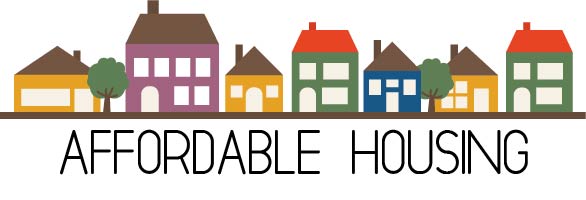 Colleen O’Dea of NJ Spotlight does a great job laying out both the present significance and background story behind a State Appeals Court’s Monday July 12 ruling that relieves municipalities of the need to provide affordable housing for at least 50,000 New Jersey tenants who are seeking affordable housing today.
Colleen O’Dea of NJ Spotlight does a great job laying out both the present significance and background story behind a State Appeals Court’s Monday July 12 ruling that relieves municipalities of the need to provide affordable housing for at least 50,000 New Jersey tenants who are seeking affordable housing today.
The logic that underpins the ruling is so convoluted as to appear arbitrary. The Appeals Court judge’s curious logic works this way: less tenants qualify for affordable housing assistance today than actually exist in the state of New Jersey because their need for affordable housing developed during a period that affordable housing was not legally mandated in the state (during the years 2000-2015).
Wow.
The Fair Share Housing Center is fighting this case on behalf of New Jersey tenants. Director Kevin Walsh points out that today, 200,000 affordable housing units are needed although the court ruling will provide for only 150,000 to be built. And to provide for future needs, a total of 350,000 units should be provided for.
Kristof: It’s not easy for white Americans to own the advantages systemic racism gives them
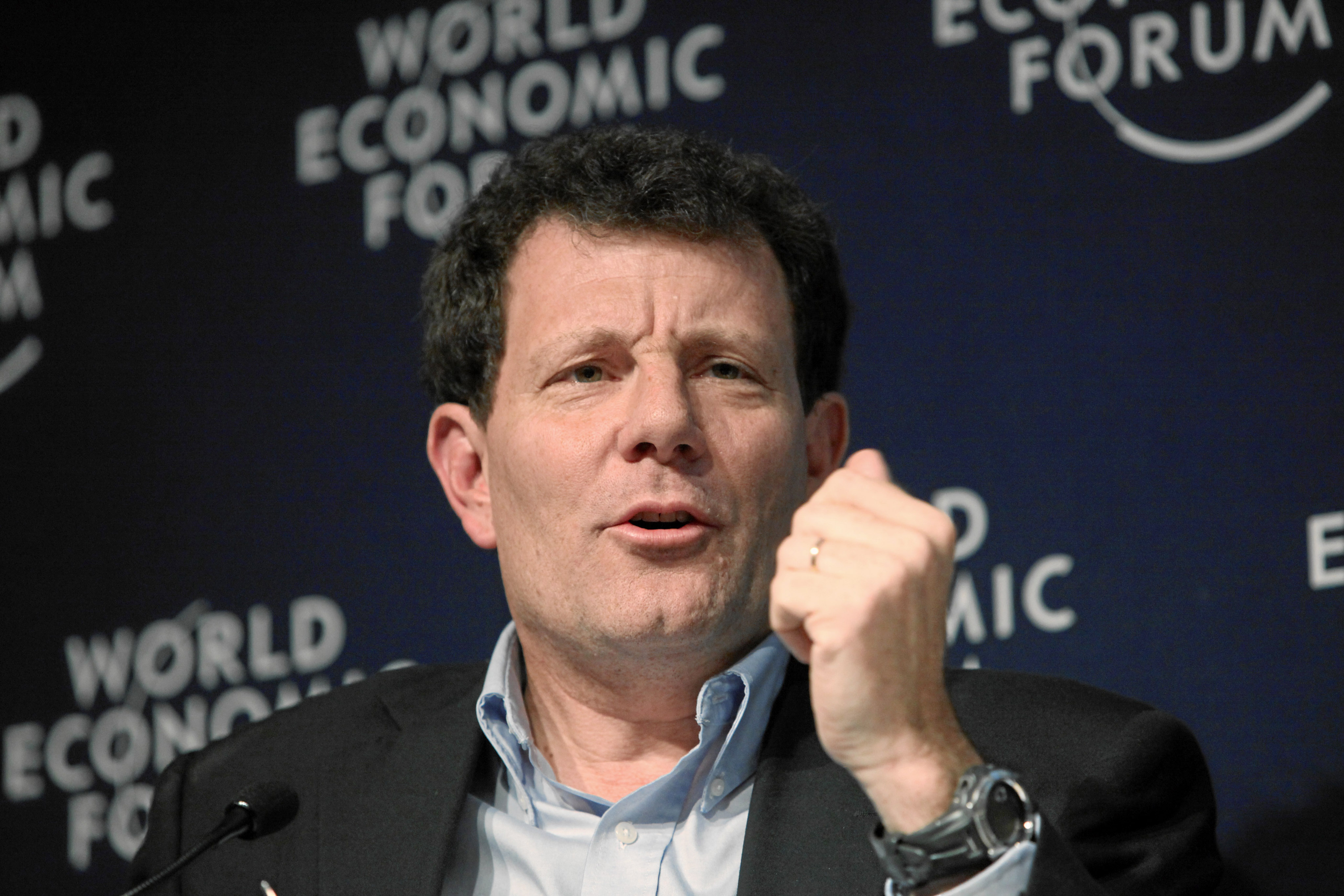
© World Economic Forum
swiss-image.ch/Photo by Monika Flueckiger
In Half the Sky, Nicholas Kristof and his wife and co-author Sheryl WuDunn told the stories of women oppressed by prostitution slavery – or just oppressive sentiment concerning women – in Asian and African countries. Now they are focusing on the disparities and injustice in American society that have been created by gender and wealth disparities and that favor people with certain racial or ethnic backgrounds, a project (and book) they call A Path Appears.
In a 2014 article, WaPo’s Emily Badger interviews Kristof on the topic of systemic racism: how it affects its victims and why it’s so difficult for white Americans to see that their advantages cause other people to be disadvantaged.
I grew up in rural Oregon, in a blue-collar area that has been very hard hit by meth, by family breakdown, by unemployment. And a lot of my friends and classmates have been struggling with all these issues. There is a real issue of personal responsibility and self-destructive behaviors — this is real. But it also arises from a context of hopelessness, a context in which people feel that there’s no escape, and then they self-medicate. And then that hopelessness becomes self-fulfilling. And that’s true of whites, and that’s true of blacks…
Emily Badger: You’ve cited a lot of data in these columns that seems pretty powerful and hard to argue with.
People were very taken aback by the figure in particular that the wealth gap between whites and blacks today in America is greater than the black-white wealth gap was in Apartheid South Africa. That was a factoid that clearly shocked a lot of people. But then the lesson that a lot of people drew from it was “well, boy, that just underscores how irresponsible so many African-Americans are,” which is precisely the opposite of the point I was trying to make.
…I think that there’s no doubt that successful people have this narrative that “I succeeded because I worked hard, studied hard, obeyed the law, and that just shows that anybody in this country can succeed if they will just behave themselves.” I think about my friends growing up, who were in many cases, just as smart and hard-working as anybody else, but didn’t have a family that pushed them. So if they made the decision to drop out of school, that was a decisions that really haunted them. I think it’s really hard for people who were born on third base, and whose friends were born on third base, and who assume kind of a third-base context, it’s really hard to understand the enormous obstacles that face those who in early life encountered a much less rosy environment. It’s so easy to hit a home run from third base and say “boy, this is pretty easy, why can’t everyone else do this?”
Hillary’s BFFs Wasserman-Schultz & Rahm Emanuel: called out by Moyers for persecuting the working poor

Rep. Excerpt from the 24 March 2016 article by Bill Moyers and Michael Winship on TPM.com on the united intentionality of Wasserman Schultz, Rahm Emanuel and both Clintons to both shift the Dem Party away from representing working folk and also persecute the working poor:
Debbie Wasserman Schultz … embodies the tactics that have eroded the ability of Democrats to once again be the party of the working class. As Democratic National Committee chair she has opened the floodgates for Big Money, brought lobbyists into the inner circle and oiled all the moving parts of the revolving door that twirls between government service and cushy jobs in the world of corporate influence.
She has played games with the party’s voter database, been accused of restricting the number of Democratic candidate debates and scheduling them at odd days and times to favor Hillary Clinton, and recently told CNN’s Jake Tapper that super delegates — strongly establishment and pro-Clinton — are necessary at the party’s convention so deserving incumbent officials and party leaders don’t have to run for delegate slots “against grassroots activists.” Let that sink in, but hold your nose against the aroma of entitlement.
But here’s just about the worst of it. Rep. Wasserman Schultz — the people’s representative, right? — has aligned herself with corporate interests out to weaken the Consumer Financial Protection Bureau’s effort to create national standards for the payday-lending industry, a business that in particular targets the poor. Payday loans, as Yuka Hayashi writes at The Wall Street Journal, “are quick credits of a few hundred dollars, with effective annual interest rates ranging between 300% and 500%. Loans are due in a lump sum on the borrower’s next payday, a structure that often sends people into cycles of debt by forcing them to take out new loans to repay the old ones.”
According to the nonpartisan Americans for Financial Reform, this tail-chasing cycle of “turned” loans to pay off previous loans makes up about 76 percent of the payday loan business. The Pew Charitable Trust found that in Wasserman Schultz’s home state, the average payday loan customer takes out nine such loans a year, which usually has them mired in debt for about half a year.
New White House #DiaperGap program will cover every baby’s bottom!
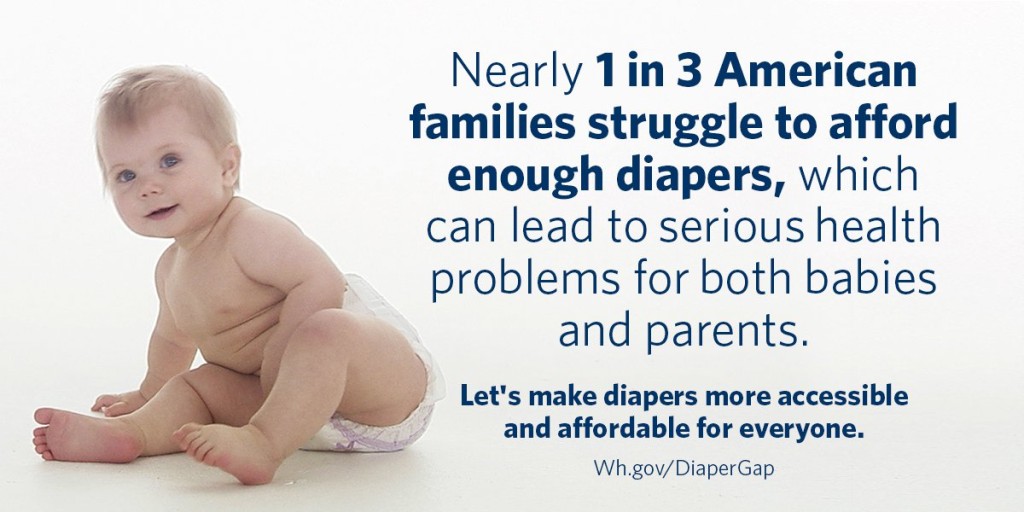
This may sound way out there but I can totally relate to the difficulty 1 in 3 families have with the expense of diapering their babies, because I had it too when my kids were diaper age – a couple of decades ago. Tomorrow at SXSW, President Obama will announce the new ublic-private-donation partnership the White House is brokering called The Community Diaper Program, which is designed to bring a comfy diaper to every baby’s bottom.
The combination of these efforts created the Community Diaper Program, launching today, and available to any 501(c)(3) organization in the United States. Now, any non-profit (whether or not they currently provide diapers to families they serve) will able to purchase diapers as much as 25 percent cheaper than the current available price, with no minimum order and 48 hour shipping. This process addresses head on the storage and timing challenges expressed by non-profits in the field. The National Diaper Bank Network, which nationwide operates over 280 diaper banks (similar to food banks), estimates that their members will order more than 15 million diapers through this program in 2016 alone. Best of all, the Community Diaper Program is sustainable, fiscally and organizationally, and will continue to benefit families for years to come…
We the People
We are a country built on the idea that every person deserves a fair shot, yet even basic baby essentials are more expensive for our neighbors working hard to make ends meet. We must do more to afford every American a great start in life?—?and by investing in early education, summer nutrition assistance, and other essentials of early childhood, President Obama’s budget sets us on that path. But today’s announcements demonstrate the tremendous power of Americans responding to the President’s call to action, and using their talents and expertise to meet the needs of working families. That commitment to civic collaboration and active citizenship will help us solve the challenges of the 21st century, in the land of opportunity for all.
Find out how you can get involved today:
- Spread the word using #DiaperGap on your social media channels
- Find a diaper bank near you and get involved
- Sign up to become a diaper distributor
Video: Hillary Clinton’s record of racist alliances and real damage to black families

Very informative and disturbing video shows the positions Hillary Clinton has taken on issues that severely impact black communities. Or as curator Jeanette Johnson-Jing puts it: A summary of Hillary Clinton’s role in the recent history of African Americans… One viewer commented:
This is a most powerful piece. Before I knew it, the tears began rolling: they have to be “brought to heel”: the repetition and visuals… OMG!?
Sometimes I ask myself why black people would support this woman … it seems such a mystery in light of all that she and her husband have done to hurt the community. I guess the Clintons with their pretty talk and powerful rhetoric have convinced black and brown supporters to play blame the victim with them – as if doing so were a game rather than the destruction of hopes, dreams, lives and families.
Harry Belafonte endorses Sen. Sanders and asks America to:
…consider and reconsider what it is that Bernie Sanders offers. He offers us a chance to declare unequivocally that there is an America – there is a group of citizens – with a deep caring for where our nation goes and what it does in the process of going.
Amen, Mr. Belafonte
Hat tip to Norm Batchelor for the video find.
Makes sense: Hillary will share her speech transcripts when hell freezes over

The Young Turks report on Hillary’s comeback to the New Hampshire debate question: will she share the transcripts of all of her speeches, even the ones she made to Goldman-Sachs? In a nutshell, Hillary’s answer was no, not really. We’ve learned that Hillary’s speaking contract stipulates that they be recorded both digitally and by a hired stenographer; and that she retains full copyright protection for all of her words.
A CNN analysis found that, since 2001, Hillary and Bill Clinton have received $153 million in speaking fees, with at least eight speeches given by Ms. Clinton to big banks for $1.8 million. The media has repeatedly asked Ms. Clinton to release the transcripts, to which she sarcastically responded on ABC’s This Week, “Yeah, you know, here’s another thing I want to say. Let everybody who has ever given a speech to any private group under any circumstances release them all—we’ll all release them at the same time.”
Ms. Clinton’s only opponent in the Democratic Presidential nomination, Bernie Sanders, earned a total of $1,867.42 in speaking fees in 2014, which he donated entirely to charity. In the same year, Ms. Clinton netted millions…
The enormous speaking fees and donations racked up by the Clintons from the financial services industry represent much more than the “artful smear” Ms. Clinton attempted to dismiss during the 5th Democratic Debate. Ms. Clinton’s record of getting paid substantially by large financial firms suggests her allegiance is aligned with their interests, rather than the American public. Nothing in her record or rebuttals suggests otherwise.


